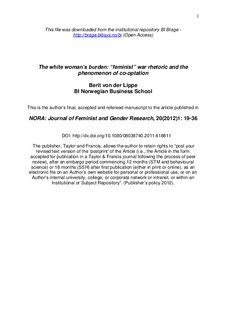The white woman’s burden: “feminist” war rhetoric and the phenomenon of co-optation
Journal article, Peer reviewed
Permanent lenke
http://hdl.handle.net/11250/93478Utgivelsesdato
2012Metadata
Vis full innførselSamlinger
- Scientific articles [2181]
Originalversjon
10.1080/08038740.2011.618811Sammendrag
This article takes a critical stance towards the rhetoric of protecting and liberating Afghan women in the wake of the “war on terror”, in this paper called “feminist” security rhetoric. An increased gender awareness in general and in relation to war in particular has influenced the ways in which war stories have been expressed over the last two decades. References to UN Resolution 1325, on women and security in post-conflict situations, will serve as both an indication and illustration of “feminist” security rhetoric, the co-optation phenomenon included, a practice that absorbs the meanings of the original concepts to fit into the prevailing political priorities. The rhetoric of the former Norwegian defence minister, Anne-Grete Strøm-Erichsen, is presented as a case study of this phenomenon. The Norwegian (and the Nordic) gender equality model has mainly been analysed from a welfare perspective, seldom from a post-colonial war(fare)/peace perspective. By analysing Norwegian “feminist” security rhetoric, I also want to push feminist rhetoric to create a space that is sensitive to post-colonial perspectives as well as political philosophy. I thereby intend to question both cultural relativism and aggressive cosmopolitanism dressed in various feminized outfits, aiming instead to suggest some common ground for feminist post-colonial voices to meet the voices of Western feminists who oppose the tendency to see whole cultures as internally homogeneous and almost externally sealed. These voices may together constitute a potent oppositional discourse to Western feminized security rhetoric.
Beskrivelse
This is the author’s final, accepted and refereed manuscript to the article
